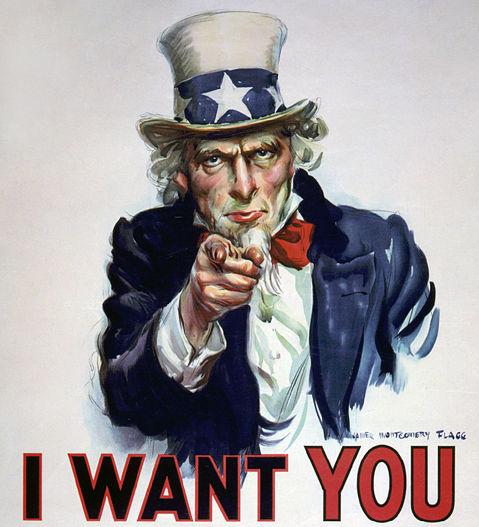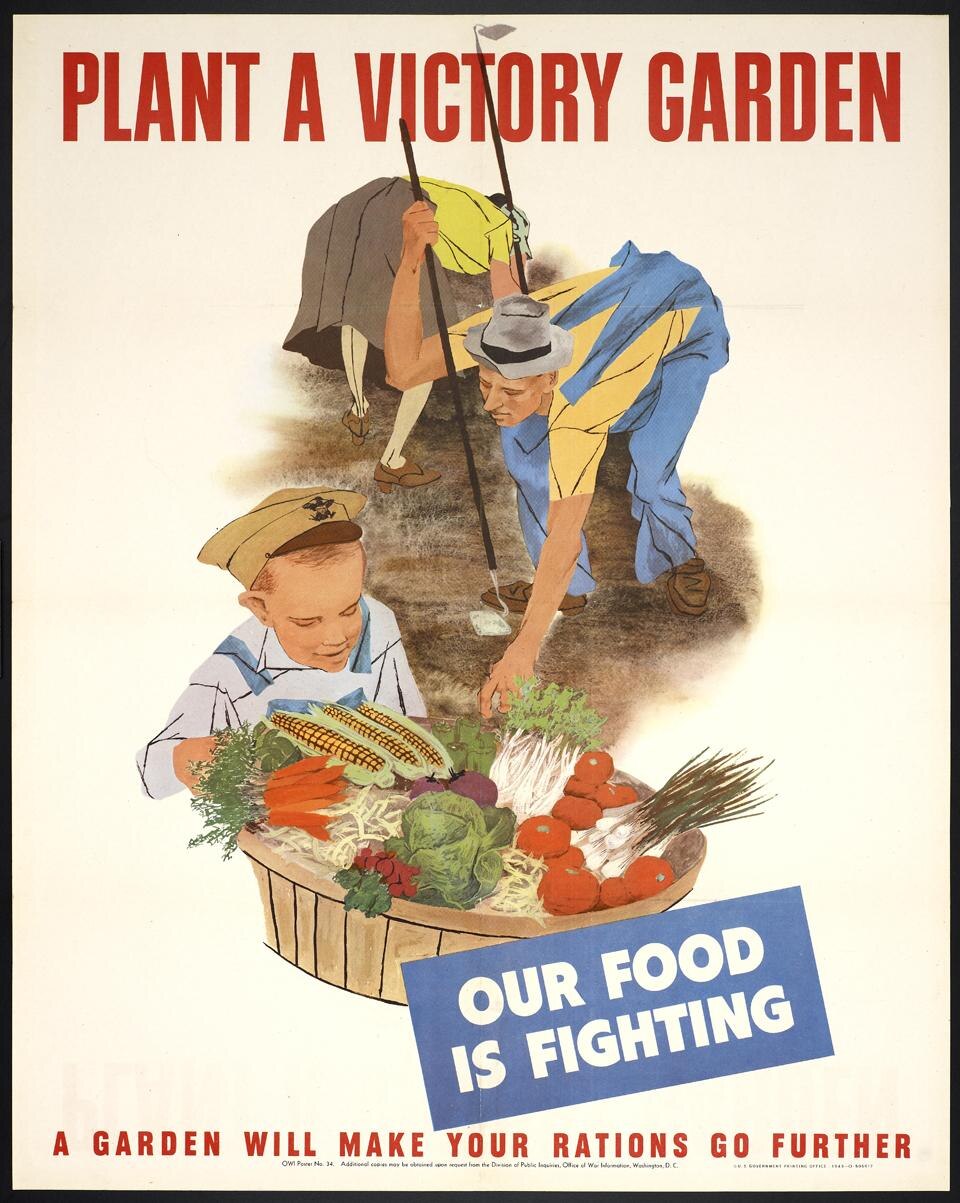Propaganda is ideas, information or rumors spread to influence people to believe or act a certain way.
Because the government was very clever in the ways they presented the war, many men enlisted in the army during WWI due to the encouraging visuals they saw on posters and in the newspaper and magazines.
Propaganda posters in WWI used many techniques to influence men by appealing to their emotions of persuasion, fear, guilt, confrontation and accusation and were designed to be advertising and appealing.
- Emphasizing patriotism, making men feel like they should be proud to protect their country with their own strength;
- Creating an exaggeration of hatred and fear towards the Germans;
- Making those who were not enlisting feel cowardly;
- Emphasizing the sense of masculinity and bravery in the armies;
- And glorifying army life, making the men feel as though recruiting was a great adventure all should embark on.
Many posters presented a distorted image of war, making the soldiers in the pictures seem as though they were the proudest men of the country, and making the conditions seem superior.
In actual fact, this was not true. Most men suffered painful deaths and those who survived had experienced horrific injuries.
The government also used propaganda to promote fear and hatred of the Germans.
 |
| This poster depicts the Germans as a blood hungry skeleton that brutally takes lives of men and drinks their blood. |
 |
| I WANT YOU! PROTECT OUR NATIONS HONOR .... this is trying to promote ownership and make men feel like they are responsible to fight. It would be dishonorable NOT to!! |
 |
| We will all work together to win this war! |
 |
| While England and France were depicted as “civilization,” Germany was shown as a “mad brute” — here, a giant, drooling gorilla weilding the club of German kultur (culture) and carrying the limp, half-naked body of a woman. As a result of propaganda like this, German Americans — many of whose ancestors had lived in America for centuries — faced persecution during the war. |
 |
Americans were not eager to enter the war, and Americans of
German
ancestry tended to support Germany, not Britain and France.
The
government’s first task was to convince citizens that they
must support the war
effort without reservation. Here, a woman
clad in the stars and stripes represents America and American liberty.
|
 |
| This famous portrayal of “Uncle Sam” first appeared during World War I. |
 |
| Planting “Victory Gardens” on the home front was encouraged because Americans needed to keep their troops (and their allies) fed by sending mass quantities of food to Europe. In order to avoid a shortage at home they planted gardens at home. |
Look online and find one example of propaganda that employs one of the strategies or techniques listed above. You can not choose one that I have already shown you on this page. Print it out (it doesn't have to be large or in color) and then write what type of strategy you think it employs. What emotion or feeling is the poster is trying to evoke?
Hint: Google: WWI Propaganda (images)
Comment on the blog:
How did Creel make an unpopular war popular and what are some ways in which he accomplished this task?
Comment on the blog:
How did Creel make an unpopular war popular and what are some ways in which he accomplished this task?
Creel made an unpopular war popular by convincing famous speakers, writers, artists, and musicians to help him 'sell' the war to the general public. He also helped create films which spread the word. Their message was that the war was fun, exciting, and it made your family proud. They wanted potential soldiers to feel sympathy, encouragement, or inspiration.
ReplyDeleteThat's very true! And I bet they felt a whole lot less inspired to fight in the war when they got there. But he did get many unwilling people willing to fight in the war. So he was neither a good man, nor bad man. He was just smart.
DeleteI think some of the ways he accomplished this was how he helped direct the movie: Under Four Flags. They actually made money for WWI and it helped pay for some of the artillery. He also convinced famous speakers, writers, artists, and musicians to help him 'sell' the war to the public.
ReplyDeleteI also think it was really cool how they made a movie to help convince the people to join in the war effort, and at the same time make money to support the war effort! I also liked how there were 'Four minute men' who just like stood on a box and carried out their speech in front of the public.
DeleteYeah, making money for the effort, plus influencing people is a pretty smart way of doing it! ;P
DeleteCreel made an unpopular war popular in some ways by using his personal gift of writing/advertising and combining that with other people's gifts. For example, other writers, speakers, artists and even some musicians. He accomplished his task in the ways that it really publisized the war by making it sound "exciting". Wether you were reading a book, walking down the street seeing posters, watching a movie, or even listening to music you would hear of the war in that of an exciting and encouraging way.
ReplyDeleteThat's a cool way to put it Tanah! :) His gift, yes, combining gifts. :) I mean, not everyone could do what he did!
DeleteThat's an awesome way to summarize it Tanah! Its so sad that he did that to the people and made them go into the war with false hope. And so many were killed or injured so I bet that came as a surprise to their family that might still have false hopes.
DeleteI think Creel made the war popular with posters and movies depicting Germans as a wild animal that needs to be stopped like the movie King Kong (1933).
ReplyDeletethat's a funny and pretty accurrate way to think about it :o
DeleteHe made the war popular by getting the best writers, musicians, artists, and advertisers to help him "sell" the war and some ways he accomplished that was by making books, posters, and even a movie about the war to make it sound exciting
ReplyDeleteDefinently! I wonder how big his team of writers/artists was! It also surprises me that a majority of the citizens fell for the posters!
DeleteI know! Wouldn't they have learned from their ancestors how awful war really is? :( I guess if it's everywhere it would be hard not to be influenced by it. ;(
DeleteThe way that I think Creel make the war popular was by selling it for more then it was.
ReplyDeleteI think thats a terrible way to do that. I mean, I think enough people would have joined the army just because of guilt. He didn't need to crack it up to be something it wasn't!
DeleteThat's true that it's not a good reason to deceive people, but also, he was super important. If we didn't have all of the soldiers he helped recruit, America could have been in a big military hole.
Deletei also agree with even because that is not a good way to do war war is to help people fight or our country
Deletei also agree with even because that is not a good way to do war war is to help people fight or our country
DeleteCreel made the war sound amazing and like it was a wonderful place. He also invoked guilt into people. I don't like some of his methods, but his movie and speech ideas were very good, I must say.
ReplyDeleteI agree, especially because the movies made money for the cause. :)
DeleteCreel made WWI popular to many by recruiting writers, actors, musicians, and other people who interacted with the people with entertainment or other things, to help him convince the people to help the war effort. One of the things he did was hire speakers, or what he called 'Four Minute Men', who made impromptu speeches in the streets, to the people, saying things to convince the people to help the war effort. For Men to enlist in the military, for women to help in war-product producing factories, and or plant Victory Gardens with their children to add to their rations, so that more factory, or mass-made food can go to the soldiers, and the food from the Victory Garden would support the family.
ReplyDeleteI thought it was really cool how the President was smart and chose a former, or current muckraker to do the job.
creel made successes by movies and people helped him
ReplyDeleteI learned all about propagandas last year and each one of there posters follow the rules of propoganda 100%. Creel mad the war seem so much better than it was. Although the things said were true, they were totally exaggerated and the poster also left out the part that they would most likely die there.
ReplyDeleteCreel made an unpopular war popular by advertising through the entertainment industry. Some ways in which he accomplished this task were through books, movies, posters etc.
ReplyDeletei think that creel used true but vaguely true content like they told u about the camps that dont get any action and live great to make the war zone sound fun and relaxed but creel didnt tell u about the camps that get captured or heavily hit by the opposing country and extremely injured
ReplyDeleteCreel made movies and posters that evoked guilt into the hearts of the future soldiers. The movie made war sound easy and that caused people to think entering the war wasn't a big deal. He also used 4 minute speeches to fire people up to go fight in the war.
ReplyDelete